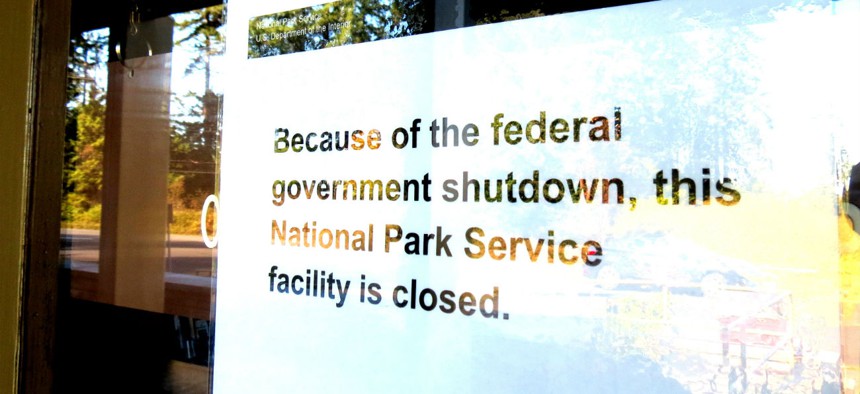
Some of the provisions would protect federal employees during a lapse in appropriations. Shane Farnor/NPCA
All the Federal Workforce Provisions Tucked into the Defense Policy Bill
In addition to providing 12 weeks of paid parental leave, the authorization act offers additional shutdown protections for feds and codifies the federal “ban the box” policy in hiring.
The biggest news for federal employees related to the bipartisan deal on the annual defense policy bill this week was that all federal workers would soon be eligible for up to 12 weeks of paid parental leave.
But as an annual must-pass bill, the fiscal 2020 National Defense Authorization Act, which is slated for a House vote Wednesday, is a common vehicle for legislative language that affects all of government, not just the Defense Department.
In addition to the landmark paid leave policy, the bill includes a number of provisions designed to protect federal workers’ benefits during a government shutdown. One measure ensures that federal workers’ dental and vision insurance cannot lapse because of a gap in appropriations.
Currently, if employees enrolled in the Federal Employees Dental and Vision Program are furloughed for at least two consecutive pay periods, then they are billed via mail in order to maintain coverage, and their policies are subject to cancellation for nonpayment. If signed into law, a provision of the authorization act would stipulate that all FEDVIP plans continue to cover employees over the course of a government shutdown, regardless of its length.
Additionally, the act includes language that would consider the administration of the Federal Employees Health Benefits and the Federal Employees’ Group Life Insurance programs to be essential services, thus excepting employees that work on those benefits from shutdown furloughs. This provision stems from the 35-day partial government shutdown earlier this year, as a number of federal workers reported being unable to add newborn children to their insurance policies because the employees tasked with processing those changes all were furloughed.
The compromise bill also includes a longtime priority of the late House Oversight and Reform Committee Chairman Rep. Elijah Cummings, D-Md., the Fair Chance Act. That bill would delay asking jobseekers if they have a criminal history until the conditional offer phase of the federal hiring process. It would apply to both agencies and contractors that work directly with the federal government.
Agencies already follow this policy, as it was implemented administratively in 2016, but contractors are not required to do so.
President Trump tweeted his support for the Defense authorization compromise Wednesday, all but guaranteeing its enactment.
“Congress—don’t delay this anymore!” he wrote. “I will sign this historic defense legislation immediately!”







